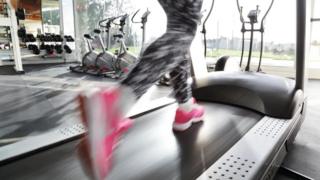
 Image copyright Getty Images
Image copyright Getty ImagesGyms, swimming pools, leisure centres and children’s play centres are allowed to reopen as lockdown eases in Wales.
A personal trainer in Cardiff said he was excited to get back to the gym, but had found it “amazing” to see how the industry had adapted to working online.
The owner of a soft play centre in Rhondda Cynon Taff said she was excited but surprised to be able to reopen as businesses in England await a date.
Councils have been given extra powers to enforce legal requirements.
The Welsh Government said businesses are legally required “to minimise the risk of exposure to coronavirus” on their premises.
- What do the latest lockdown rules say?
- ‘I can’t wait to be back on the squat rack’
- ‘Soft play is heading for a cliff edge’
- ‘We’re now at the limit of easing lockdown’
If businesses fail to comply, local authorities can issue improvement notices or, in the event of a serious breach or a failure to comply with a notice, an order to close.
Requirements include:
- Ensuring people maintain a two-metre distance where possible
- Implementing measures to avoid close interaction when social distancing is not possible, such as installing screens, using face coverings and improving hygiene
- Providing customers and staff with information to help them understand what they need to do in order to stay safe on the premises
- Areas which cannot be easily cleaned – such as ball pits – should remain closed.
Gyms and leisure centres
While gyms and leisure centres are able to reopen, they will look very different to the way they did before the pandemic.
Saunas and steam rooms will remain closed, equipment will be more spread out to allow social distancing and swimmers are asked to arrive at the pool “swim-ready”.
At the start of lockdown, people were limited to exercising outside once a day, not allowed to travel except for essential reasons, and were unable to exercise in groups.
“Initially I thought ‘you can close whatever you like, but just not the gyms’,” said Louise Downie-Davies, who had been attending small personal trainer-led classes at SOS Athletic Excellence, in Cardiff.
Since that day, Ms Downie-Davies said she has been working from home, training from home and “attempting” to home-school two children aged six and 13.
But the gym quickly switched to classes held over Zoom, which she enjoyed “more than I thought I would”.
Asked how she felt about returning to the gym, Ms Downie-Davies said: “I’m not as excited as I thought I might be.
“I think that’s because I have been doing difficult stuff in my home workouts.
“But it will be nice being out of the house and seeing gym friends – it’s good to have the motivation and competition.”
Her personal trainer, Greg Foley, said the gym had “got ahead of the curve” in terms of online sessions, and that the small size of the classes “should make it easier to transition out of lockdown”.
But he explained personal trainer-led businesses have had difficulties in other ways, particularly when it comes to taking on new customers when they cannot meet in person.
“It has been very hard to build that emotional connection, which is important in getting the client to buy into the process,” Mr Foley said.
“If they don’t trust you, they won’t trust what you are trying to get them to do.”
Gyms have had to adapt quickly to online working to survive, and Mr Foley believes some changes may become permanent.
“As a personal trainer, I was taught ‘online would never work’, so it has been amazing to see how quickly the industry has changed.
“A lot of clients will be happy to stay online because they have seen that, actually, gym equipment is not absolutely necessary to what they want to achieve.
“They see the amount of family time wasted, whereas they can drive home and do their workout in 45 minutes.”
Another Cardiff gym owner thinks the coronavirus pandemic has highlighted the importance of physical fitness for overall welfare.
“The benefits the fitness industry can have on individuals in terms of keeping them fit and healthy and safe, that’s something that has to be the priority going forward,” said Robin Soden-Taylor, of Ion Strength and Conditioning.
But the restrictions will impose extra costs on businesses that will not be operating at full capacity.
“Since it was announced, everyone’s been phoning, saying ‘when can we get back?’,” said Paul Jenkins, director of the Diplomat Hotel and Spa, in Llanelli.
“We’ve had to get all the sanitising machines. They’re all essential. Extra staff have been taken on in the gym for sanitising.
“For equipment, screens have been put in reception, and signage everywhere. It does work out quite expensive, but it’s got to be done.”
Play centres
Children’s play centres in England have still not been given a date for reopening, making Friday’s announcement a surprise for some in Wales.
“We weren’t expecting it at all,” said Carol James, owner of Tiny Tumblers, in Church Village, near Pontypridd.
“We were waiting for England to get the go-ahead, then we thought we would be about three weeks behind England.”
Although it would have been nice to have “more time and more guidelines”, Ms James said the news was “fantastic – I can’t wait”.
And Gwen Evans, owner of Cantref Adventure Farm in Brecon, told BBC Radio Wales the news had come “very suddenly”.
“We weren’t expecting to be able to open the soft play, so we’ve been busy putting processes in place,” she said.
“We’ve been changing our booking systems. There’s a lot of logistics to get it up and running for Monday, but it will be fantastic.”
Ms Evans added that extra costs and the loss of income from what is usually one of the busiest times of year, would make it an “uncertain autumn and winter”.